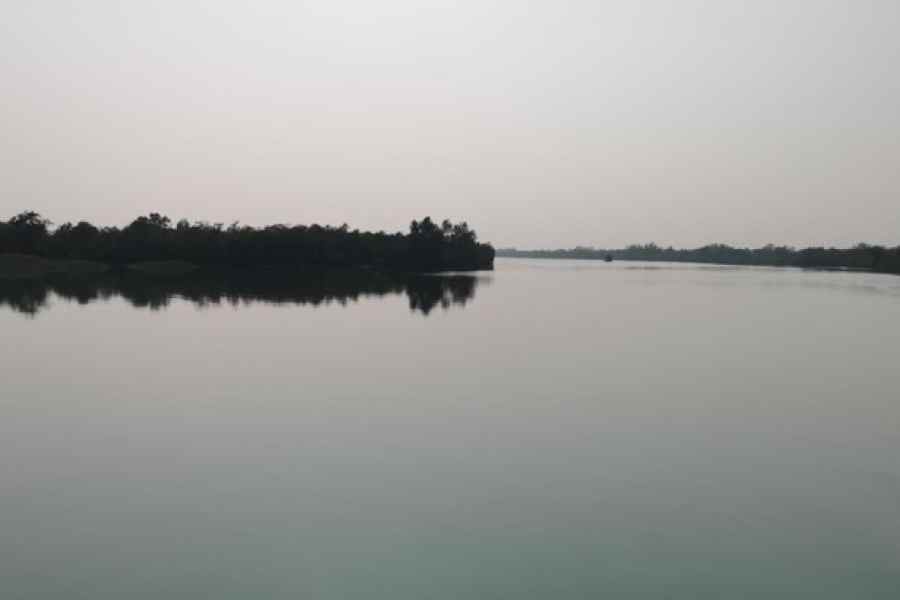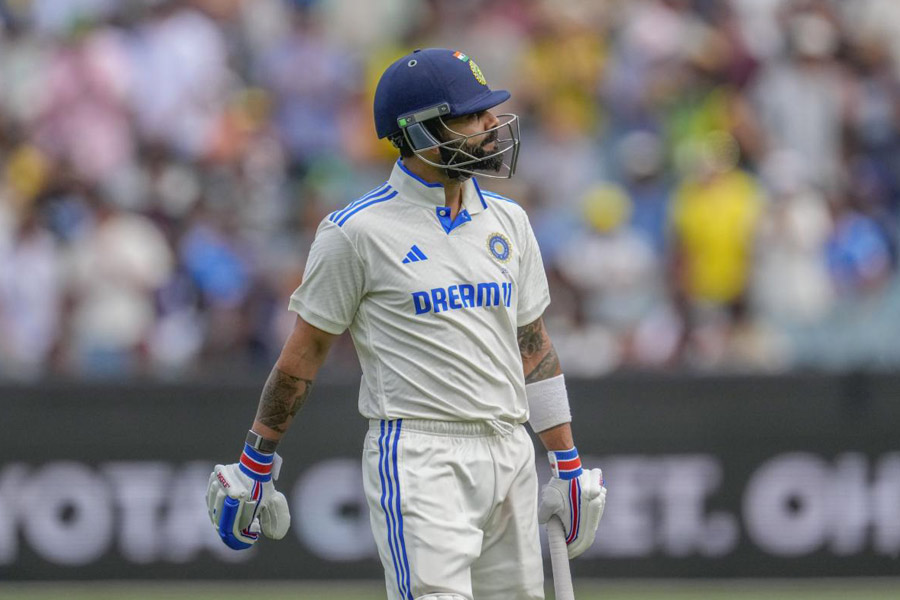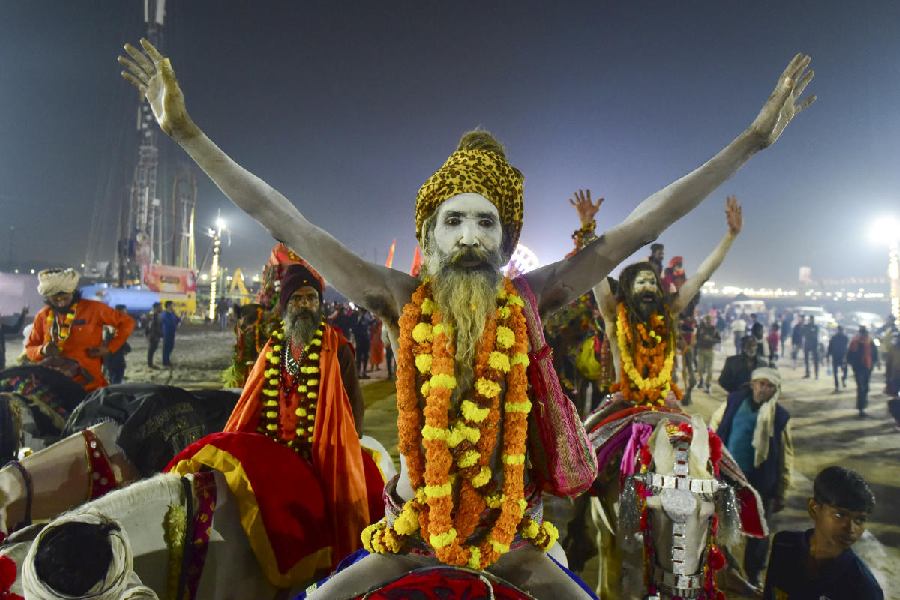The canal leads away from the city. Black, viscously filthy. You can see the high-rises at the edge of town spearing the sky behind the trees, and the massive half-tube of dirty water seems to come directly from them. After a few minutes, the canal develops a backdrop of hillocks, a low mountain range of garbage and, together, they escort the traffic past the extreme edge of the urban sprawl. The trash summits recede as you drive along; almost imperceptibly, the water in the canal becomes cleaner. In a little while, the highway bisects the zone of fisheries and brick factories, the kiln chimneys reflected in the big shallow-trays of water.
After about two hours of driving, we cross a bridge and the driver informs us that we are now leaving the mainland and entering the delta. I have been here a few times, but many years ago, always for some kind of work and never for longer than a day; this is the first time I’m visiting for a ‘tour’, accompanying two friends from abroad. At the main port, there is a melee of tourist boats of various sizes and we teeter across a few prows to reach the launch on which we will spend the large part of three days. The engine starts to sputter and we slowly reverse out of the maze of moored vessels. Alongside, we can see the larger boats filling up with enthusiastic tourists, parties of twenty to fifty people per boat, wrestling cool-boxes, umbrellas, excitable children. The top deck of one boat is prowled by men in pseudo-camouflage jackets and floppy hats, two or three of them propping up tripods with huge lenses to which camera bodies are attached like small afterthoughts.
Within ninety minutes, we have picked up our guide and entered the channels criss-crossing the reserve forest. From the moment we enter, the eyes start behaving differently, looking, looking, looking for the return gaze of eyes you don’t want to see too closely. As we wait to catch darshan of the Empress of Shadows, the Striped Lord, the Southking, other creatures begin to dot our consciousness — birds, deer, a monitor lizard wrapped around a tree like a politician hugging a foreign dignitary.
In the peaking sun, the forest dances at the edge of the water. The guide reels off the names of some of the eighty-four varieties of mangrove and other kinds of trees, strange names which are new to us, bain, kewra, kholshi — the flowers of which cage the best honey — genwa gaachh, neatly manicured by deer jumping to nibble the sweeter higher leaves, the centipedal gorjon aka the walking tree. The mud banks themselves are living palimpsests marked by creatures and things trying to survive: crabs, large and tiny birds, the spike-carpets of breathing roots and, suddenly — “There look! Crocodile”. Two of us just about catch the large guy sliding into the water, a slab of darker brown peeling off the lighter brown, its entry sending a large white egret into gawky flight like in one of those chain reaction videos where things topple into one another.
We alight at a jetty to visit an ugly concrete ‘tower’. The man-made ponds are deserted in the afternoon light. Other tourists push past us as we come down. “Hello, where are you from?” Not a friendly question but a couple of young men sneering at my friends. “Oi lok ta toh Indian mone hochhey!” (that man looks Indian), says a young woman and I have half a mind to tell her exactly how Indian I am but I leave it. We look at a rust-eaten map. The men’s toilet smells as it only can in my golden Bengal. Then we are back on the boat, looking, looking, looking. Just before dusk, we dock at the island where our lodge is located. Legs feel strange standing on firm land, the underfoot throb of the boat engine suddenly gone.
The next morning, our boat heads out in heavy winter fog — “It’s called kuasha,” I translate, “one of the most beautiful words in Bangla.” In the soft murk, all kinds of floating things take on a magical aspect — fishing markers, silent barges carrying fly ash to Bangladesh, two fishermen on a small boat that could have sailed down many centuries. On the grey-brown banks, things are on the move. The guide begins his avian roll-call — Sandpiper, Common Red Shank, Curlew, Whimbrel, such and such Kingfisher. Then, without warning, it’s all gone. We seem to be sailing in a grey chamber sealed off from everywhere else, a few feet of water visible in front of us, the rest of it a cocoon of fog. After a few long minutes, a darker line solidifies in the grey: land, water, doubt, jungle, river, haze. A sandbank hiding just below the surface, one that we must circumnavigate carefully to enter a narrow channel that will take us into a different part of the jungle.
As the gloom lifts a bit, the mud banks seem very close on either side of the launch. The captain of the boat gives off a grunt and the guide reacts immediately — “There! Pug marks on the mud! Maybe one day old!” All three of us tense up, trying to part the fog with our eyes. “We can’t see her but I’m sure she can see us!” says one of my friends. I look at the passing mud and try and calculate a full-grown Stripo’s leap-range: it looks like an easy spring. The guard reads my mind: “Don’t worry, they don’t attack moving motorised boats.”
As the day opens up, we begin to pass other tourist boats, all of them flying the Indian tricolour; I suppose this isn’t entirely superfluous so near the international border. At one point, the captain stops the boat and reverses; a slash of light brown on a mud bank coalesces into a crocodile having a siesta. Soon after this, we begin to see monkeys, then spotted deer, then a boar disappears into a tunnel of trees. Still no Big T, still no National Animal.
Jungle, river, sky, distant treelines reflected on the water, soundspikes stretching across the horizon, vast water under vast ceiling. After a couple of days of this, when you see a tourist boat pass by, you realise how ridiculous we are, we humans, how utterly mad it is, this conceit of a nation-state, the hubris of flags and borders. On the last day, on the way back to the main port, the thought comes: countries are like chars, like these silt islands; they form for a while, break up and reform, alliances and associations constantly being sculpted by the slow waters of history. The boat passes an empty bottle of Jameson’s whiskey floating under the branches. It passes two egrets and a piece of plastic perched on a low tree. The whiff of diesel fumes gets stronger and stronger as you join other boats heading to the jetty.











